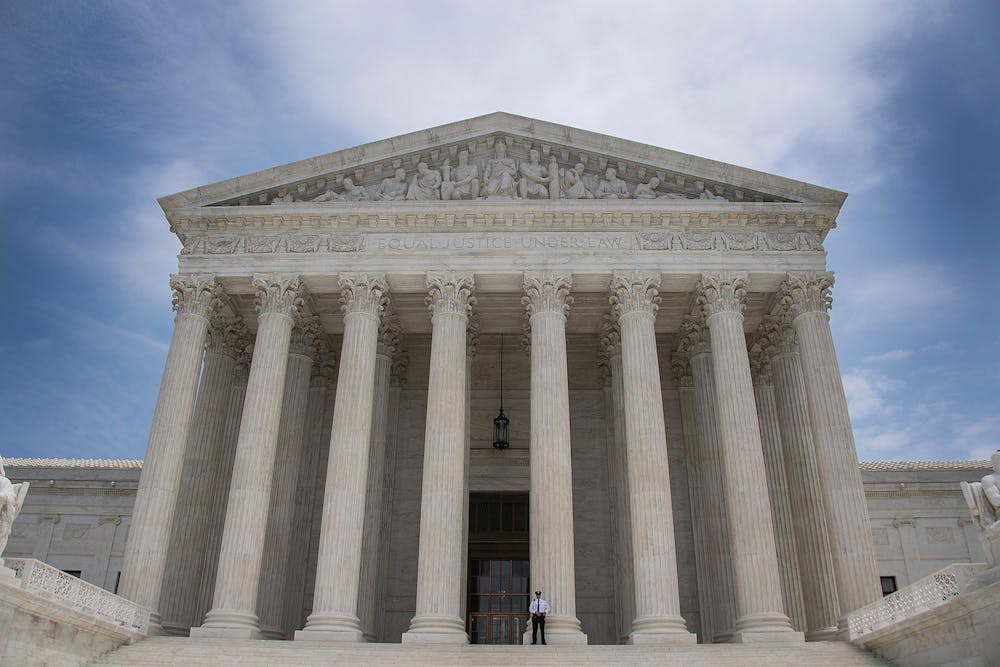Thursday’s Supreme Court decision to block President Donald Trump’s attempt to end the Deferred Action for Childhood Arrivals program will protect about 700,000 DACA recipients in the country from being deported. Out of these recipients, 240 were students at one of IU's campuses this past school year.
IU President Michael McRobbie praised the ruling in a statement Thursday as well as IU students and alumni who are DACA recipients.
"These high-achieving students and alumni are Americans in every sense but immigration status,” McRobbie said in the release. “They were brought to this country as children, worked hard for their education, and many now work and pay taxes in the U.S. Their contributions help strengthen the civic, cultural, social and economic fabric of the country.”
Shruti Rana, international law professor and director of the undergraduate international law and institutions program at the Hamilton Lugar School of Global and International Studies, said she was happy about the decision but does not think it adequately protects recipients.
Rana said the court blocked Trump’s attempt to end the program because the president did not give enough reason to terminate DACA or follow proper procedures in his attempt to get rid of it. The court’s decision did not say anything about the legality of DACA, which was put into place by former President Barack Obama in an executive order.
“That means that there’s a lot of room, unfortunately, for the executive to issue new executive orders,” Rana said.
She compared the situation to the Muslim travel ban in 2018 when Trump kept changing his executive order until the court passed it. This is a possibility for DACA as well, but this would take time, Rana said.
“It’s unlikely that they’d do something very quickly in terms of coming up with a more reasoned decision, but it doesn’t mean they won’t try,” Rana said, referring to the Trump administration.
John Nieto-Phillips, vice provost of diversity and inclusion at IU and main contact for DACA recipients at IU-Bloomington, said the fact that Trump's attempt to do away with DACA didn't pass the Supreme Court shows the government's lack of planning for DACA recipients if they were to lose their protections under DACA.
"They didn't think what this would mean for these students," Nieto-Phillips said. "The ruling basically highlighted that there was no thought given to the implications of the order."
Rana and Nieto-Phillips said the ultimate protection for DACA recipients would be a law passed in Congress to protect them permanently from deportation and offer them a path to citizenship.
“All of this could have been taken care of from a law passed by Congress,” Rana said. “It’s just that there’s not enough support in Congress to pass the legislation. That could change too. It could be that if there’s enough of an outcry, something could be done.”
DACA recipients have garnered widespread support among Americans. According to a Pew Research study, 74% of Americans would support a law granting citizenship to people brought to the U.S. illegally as children. This includes 54% of Republicans.
Rana said one of the reasons DACA recipients do not have a path to citizenship is because of laws passed by Congress when recipients were young that eliminated several paths for immigrants to becoming a legal citizens.
“I regard this as a longer-term tragedy,” Rana said. “This is a problem that’s so widespread, affecting so many people and an issue on which Congress has failed to act.”
Nieto-Phillips and Rana both said the politicalization of immigration has led to Congress becoming too polarized on the issue. Nieto-Phillips pointed out the lack of paths to citizenship as a way of restricting immigration, something the U.S. has done since the late 1882 when the government put a restriction on the number of Chinese immigrants that could come to the U.S for a decade.
"These questions are not new," Nieto-Phillips said. "They go back 100 years. We're reliving them over and over and over again."
Rana said while she is happy that Trump’s decision to end DACA was thrown out by the court, she wants more permanent protection for DACA recipients, which would be a path to citizenship.
In McRobbie’s statement, he renewed the university’s promise to protect DACA recipients at IU to the best of its ability.
"We will work within the bounds of the law to support you in the pursuit of your dreams, and, as expressed on our comprehensive DACA @ IU website, we will continue to vigorously investigate and refer for prosecution anyone who threatens, intimidates or harasses any member of our community,” McRobbie said. “And we will continue and intensify IU's long-standing advocacy for expanded access to higher education for all IU students living in the U.S."
Nieto-Phillips said the website with all the services they offer DACA recipients at IU including assistance in finding legal services, financial aid, mental health services is a resource for students, as well as an upcoming virtual town hall meeting from 10 to 11 a.m. Thursday.
This meeting is open to all who are interested but will primarily be for DACA recipient students and the people who work with them at the university, including financial aid advisors and employees in student affairs, to learn more about how the Supreme Court decision will affect their lives moving forward. Nieto-Phillips said he wants DACA recipient students to feel as valued as any other students.
"IU has made a commitment to all students who come to IU," Nieto-Phillips said. "Our commitment is to support them."




